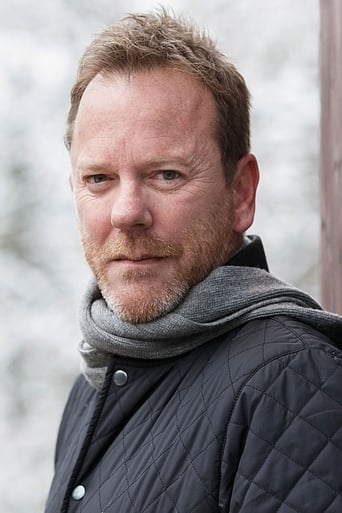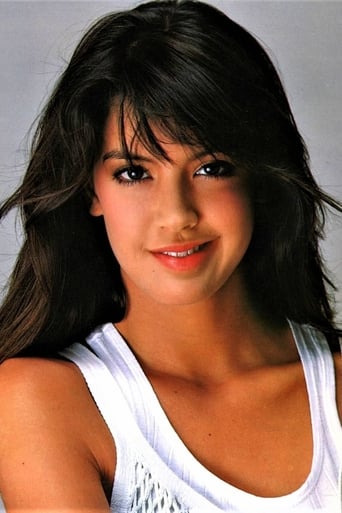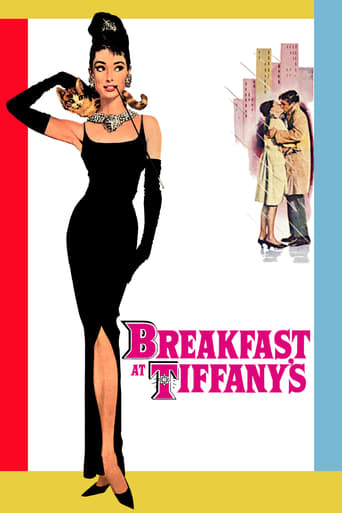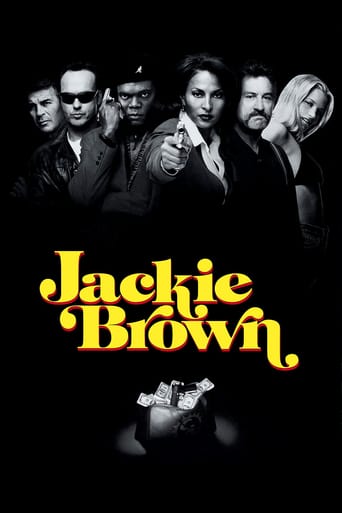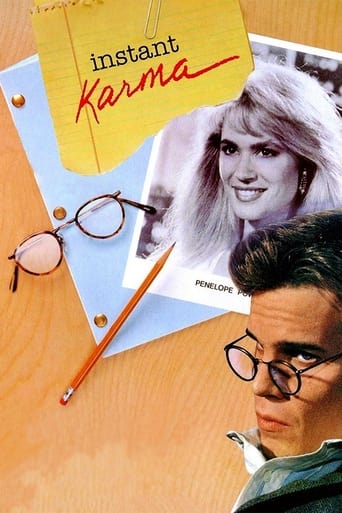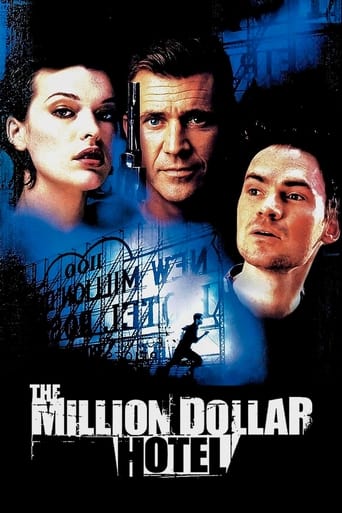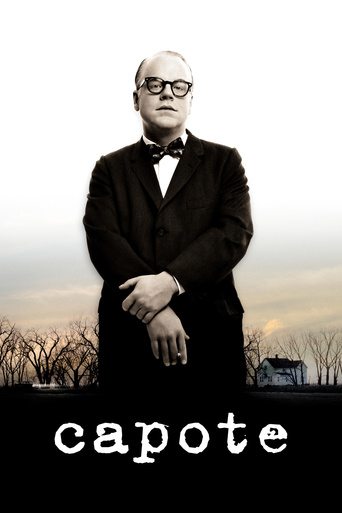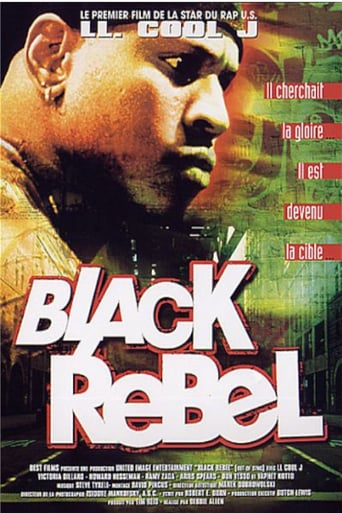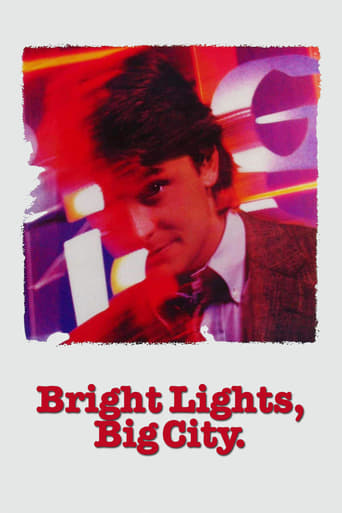
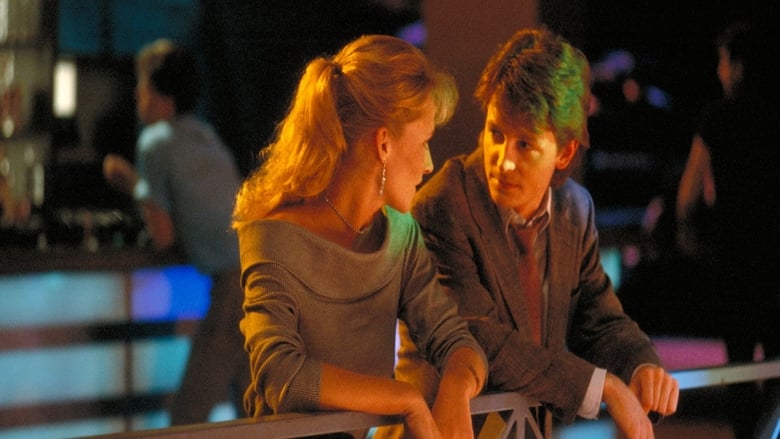
Bright Lights, Big City (1988)
A disillusioned young writer living in New York City turns to drugs and drinking to block out the memories of his dead mother and estranged wife.
Watch Trailer
Cast


Similar titles
Reviews
I won't bother with recounting the plot--plenty of others here have done that--but I will give some thoughts from the perspective of a 40-something who remembers fondly the movie and the times from whence it came.I remember hating this movie when I first saw it back in the day. I'd read half the novel and hated that too. My main memory of both of them, oddly enough, was the Coma Baby. It features heavily in the book but somewhat less so in the movie.Watching it again so many years later and so many years out from the 80s, I was surprised to find myself enjoying it. Perhaps it was a nostalgia thing. My mind was certainly flooding with associated memories. 1988 was the year I finished high school. I was soon to leave my little red-neck country town and move to the big smoke where a whole new life would begin (and there have been at least three more since then!).Some positives: I'm a huge Donald Fagen/Steely Dan fan, so Fagen's soundtrack was appreciated. It doesn't really sound like his regular stuff (until the very end), and was, frankly, often quite cheesy and even out of place at times. But I convinced myself I liked it. Other Fagen fans may also. The movie really grabs the 80s very effectively. Nightclubs, hair, blow, the whole bit. There is a surprising appearance from the wonderful Jason Robards which, shamefully, is uncredited according to IMDb. Considering the size of his role this is kind of odd.Negatives: Phoebe Cates seemed completely unconvincing as a model and Michael J. Fox was completely unconvincing as a...sorry, but, hey...as a grown-up. He's never really any different from how he was in Back to the Future or even Family Ties. He's still all got up in jeans and a suit jacket, skipping all over the place, and gulping, "Shucks" (at least seemingly). No disrespect to the guy. Just that this movie reminds that he was never so well suited to anything with pretensions to being serious. And that last point sums up the problems with this film: it eventually becomes apparent that the movie is trying to be taken seriously. It just doesn't work though. A pretentious novel as starting place doesn't help. Ham acting and cheese dialog don't help none neither.Still, an enjoyable time capsule. Kiefer does OK as wise-a** friend. The wonderful Frances Sternhagen, an appearance from the then-soon-to-be-late John Houseman, and even the magnificent William Hickey. Tracy Pollan is gorgeous and Swoosie Kurtz is her usual charming self. The ending is quite poignant, featuring Dianne Wiest, but isn't enough to really justify getting there.If you're 40-something, watch this with ice cream and snacks on a lazy weekday evening. If you're younger or older than that...probably don't bother, coz it ain't really that great.
A lot of the scenes take place in nightclub restrooms and other bathrooms. This is where the characters snort their coke, and stare at their own disappointed faces. What's remarkable for NYC in the 80s (in any decade, really) is that every single toilet stall and urinal is fantastically clean. I take this as a symbol for the movie as a whole - all rather sanitized. It's not bad, but the plot falls off rather suddenly at the end. Some viewers might not notice, of course, since nothing was ever that worrying, in any case: it's all too well-scrubbed. All the main character ever has to do to fix things is tell his friends he's going to go home and get a good night's sleep. It's hard on a movie when the big question is "will he nap, or won't he?"
I was fooled by comments here into watching this one. It is, in a sense, all flashback without an establishing context. We don't learn until the end that much of Fox's problem results from his mother's death. The other reason -- the 'divorce' -- is made much of but no context for that is established. So -- he drinks, snorts, and fails in his job as a fact-checker for a Vanity Fair type of magazine. And -- so what? The motivation seems just to be self-destruction, and that is not particularly interesting. I suppose the Robards character (like the coma baby) is a 'reflector' of the main character. But the Robards character seems actually to have had a life at some point in the distant past. What is he doing now? Is he still holding down a job? Why was Fox's character broke at some points yet affluent at others? Can anyone drink vodka all day, snort, and still function? His treatment of his brother was not only nasty, but unmotivated. What was the point of the ferret episode? The main character's equation of his friend and ex-wife at the end was incomprehensible. This is an incoherent ramble. No story. Tedious and radically un-involving.
It must have struck cinematographer Gordon Willis as highly ironic that he would shoot a film with the title "Bright Lights, Big City". Willis, known for his fabulous work with dark, muted colors and characters in shadows or silhouettes, seems absolutely lost within this night-life milieu, which isn't bright and hardly seems big. Jay McInerney adapted his own 1984 novel about a would-be writer in New York City whose job in the research department of a prominent magazine (Gotham!) is constantly threatened by his drug use, which may stem from a broken marriage and memories of his deceased mother. It's not difficult to pinpoint what went wrong here: although Michael J. Fox may seem well-cast from the outset, it clearly becomes apparent he's in over his head. Fox (whose plastic voice-over narration was probably supposed to sound hard-boiled) is too well-scrubbed and corn-fed to be convincing as a party maniac; acting disoriented by blinking his eyes heavily and tightening his thin mouth, Fox is strictly a morose good-time guy, mourning the separation from fashion model spouse Phoebe Cates. But there's nothing at stake for this kid when he stays up all night (except for his job at the magazine, which hardly matters to us since the sequences set there are wholly unconvincing). Director James Bridges takes an episodic approach to the narrative, but his continuity (or perhaps the editing) is sloppy and gummy, and the people in Fox's small circle aren't terribly interesting. And did the movie go through a budgetary crisis? The weak nightclubbing scenes look barren and cheap (aside from some city vistas and subway rides, the picture could easily take place in Passaic, New Jersey for all we know). When Fox goes out on a blind date with Tracy Pollan, we know instantly these two clean-cut kids will click on their appearance alone: they look like an upscale young couple coming home from a Republican fundraiser. There's nothing dangerous about Michael J. Fox or his approach to this part. He drinks, he snorts, he swears, but he doesn't live the highs and lows of an addict on the edge. Or, is this guy an addict? There's no visual punch in Bridges' staging to suggest he's anything more than a spoiled kid looking for a girl to adore him. *1/2 from ****



